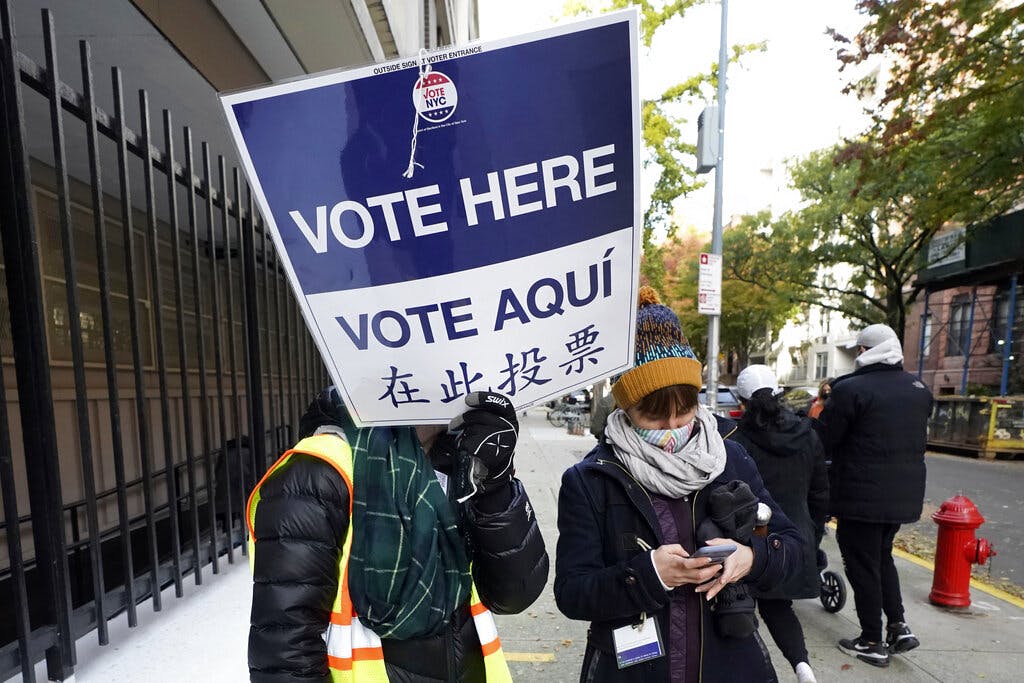Debate Over Noncitizens Voting in Local Elections Expands Beyond New York
It’s not only New Yorkers who should expect to hear more about noncitizen voting, as the movement to enfranchise noncitizens in municipal elections spreads.

As advocates of New York City’s noncitizen voting law prepare for an appeal of the decision that struck down the mandate, Americans around the country can expect to hear more about the issue as states and municipalities weigh the issue this fall.
In November, voters at Portland, Maine, will be asked to decide whether to amend their city charter to enfranchise noncitizen residents. In Ohio, citizens are due to vote on whether to amend their constitution to prevent noncitizens from voting. Meanwhile, noncitizens are already voting in San Francisco school board elections.
“Yes, we do have intentions to appeal, nothing has truly changed in the coalition and our fight to expand voting rights in New Yorkers,” the director of the New York Immigration Coalition, Wennie Chin, told the Sun. “Noncitizen voting is nothing new, we want to make sure that an expansion of voting rights is not a reduction of their voting rights.”
“We are supportive of the efforts across the country,” she added. “True representative democracy is more inclusive.”
The Our City Our Vote law, passed last year and enacted in January, would have allowed some 800,000 residents of New York City who are not American citizens to vote in city elections. It was struck down earlier this year.
Judge Ralph Porzio, who presided over the case at trial, ruled that the law violated the New York State constitution, writing that “‘every citizen,’ in this Court’s opinion, means every citizen of the United States.”
Even as the New York City Law Department cautions that it is “still evaluating” and expects “a decision to be made soon,” advocates appear ready to file an appeal.
“This decision is a setback to our vision of a free and open society, but it is not the end,” a city council member, Shahana Hanif, said. “We will continue to fight for all New Yorkers.”
It’s not only New Yorkers who should expect to hear more about this issue, as the movement to enfranchise noncitizens to vote in municipal elections is spreading across the country.
In Portland, Maine, voters will be deciding whether to approve a proposal that would alter the city charter to enfranchise noncitizens to vote in municipal elections.
The city’s Charter Commission voted 10-to-2 to support the proposal in March, moving the issue to the voters in November. Commissioner Pat Washburn, who wrote the proposal, argues that residents deserve a voice in local matters regardless of citizenship status.
“We have a substantial population of people who live here, who are part of our community, who send their kids to our schools, who rely on city services, and don’t have a voice in what the city chooses to do or not do,” he said.
Commissioner Dory Waxman voted against the measure, citing fears that the new proposal could create potential problems for noncitizen voters who would face serious consequences for accidentally voting in a state or national election if they are given the wrong ballot.
“I am terrified of the unintended consequences of this,” Ms. Waxman said at a commission meeting in March, according to Maine Public Radio. “Because with the immigration laws the way they are in the United States right now, it’s open season.”
The Portland proposal will face a challenge similar to the New York City law because Maine state law mandates that only citizens can vote in municipal elections. Maine’s constitution, which establishes itself as “the supreme law of the State,” says that “every citizen of the United States of the age of 18 years and upwards … having his or her residence established in this State, shall be an elector for Governor, Senators and Representatives.” There is no mention of local elections.
In Ohio, voters will be asked in November to go in the other direction and decide whether to specifically exclude noncitizen residents from voting in municipal elections. Ohio lawmakers passed a resolution that would change the state constitution to specify that noncitizen residents are not allowed to vote in municipal elections.
Currently, the Ohio constitution only specifies that “every citizen” retains the right to vote in state, county, township, and ward elections. The constitution says nothing about noncitizens.
The sponsors of the Ohio constitutional amendment, Representatives Bill Seitz and Jay Edwards as well as Senator Louis Blessing, argue that “Ohio elections are only for Ohio citizens.”
“The right to vote is sacrosanct and fundamental to what citizenship means in America and is why so many emigrate from around the world to the U.S., wait their turn in line, and go through the laborious citizenship process so they too can participate in this hallmark of democracy,” they wrote.
Meanwhile, noncitizen residents in San Francisco are already voting in some city-wide elections. In February, they were able to vote in the school board recall there.
Although noncitizen residents were not able to sign the petition to initiate the recall in the city, those in the United States on work visas or who hold green cards were able to participate in school board recalls themselves.
Noncitizen residents of San Francisco have enjoyed the right to vote in school board elections since 2017, after a measure passed in the November 2016 elections with 54 percent of the vote.

